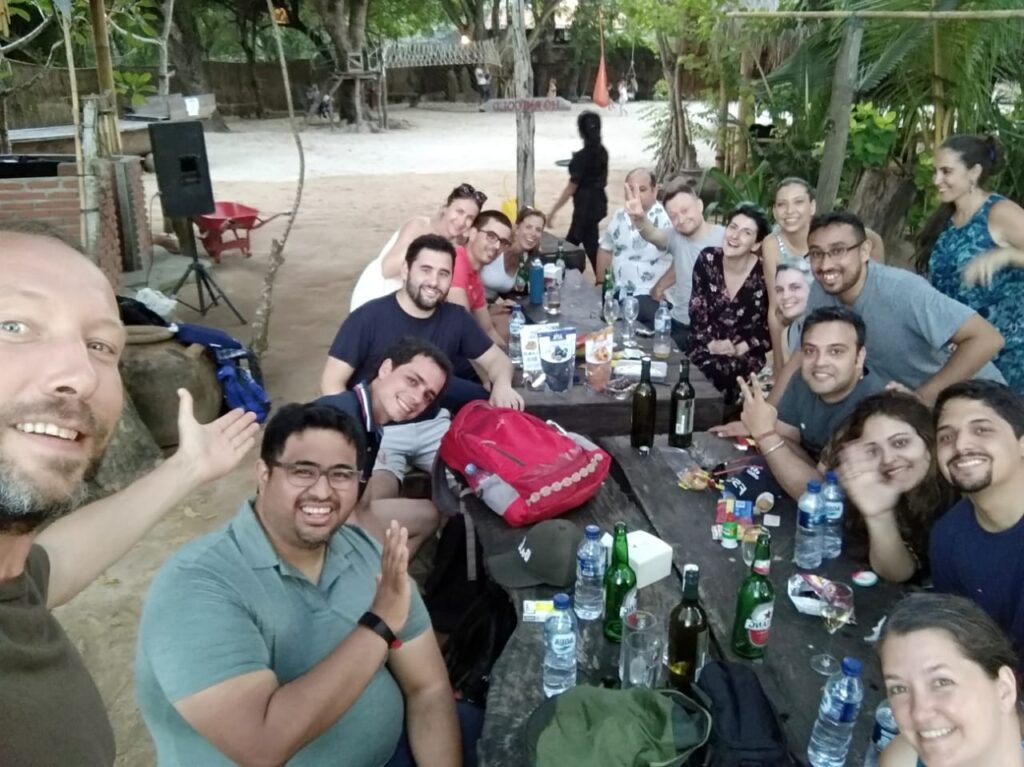
What happens to a company’s culture and hiring practices when conventional management is thrown out the window? How do expectations about when and how employees get work done shift? What about collaboration? How do the qualities that the company looks for in candidates change?
These are all big questions that Convert, a conversion optimization software company, faced as they adopted Holacracy.
I recently spoke with Morgan Legge, who fills their aptly named, “Holacracy Bootstrapper” role. We discussed what attracted Convert to Holacracy and how adopting the framework has positively impacted their hiring practices and overall workplace culture.
First Impressions
About six years ago, Convert’s co-founder and CEO Dennis van der Heijden approached Morgan with an unusual request. Dennis had recently seen a TED talk about a self-management system called Holacracy, and he had a sense that it could solve some problems that were surfacing at his growing company. Though he was unfamiliar with the nuts and bolts of Holacracy practice, he knew that shifting from traditional hierarchy to self-management would be a significant undertaking. But he wasn’t quite sure how to get started, so he recruited Morgan to research Holacracy and to design a plan to “bootstrap” an adoption.
Dennis and Morgan had met at an entrepreneurial meetup a few years prior and kept in touch. When Dennis approached her with this idea, Morgan was working in interior design and sales with a different company, and also had years of experience in project management and hiring. Although Morgan wasn’t a Convert employee at the time, he reached out to her because, in his words, Morgan “seemed blunt, passionate, and trustworthy. As I was going to be the main obstacle to overcome [in Convert’s Holacracy adoption], I thought those would be the most valuable skills I’d need to change the company.”
Morgan had never heard of this “Holacracy” thing before. Her first impression?
This is super cool! This is kind of like putting people at the center of charting their own destiny.
So Morgan got to work. She described researching Holacracy as a part-time job, spending about ten hours every week reading the Holacracy Constitution, attending online meetups, and soaking up as much information as possible — all while planning how to fully run a Holacracy adoption.

Workplace Culture: Autonomy and Creativity
As Morgan began her research into Holacracy practice, the emphasis on autonomy immediately stood out. As a hiring manager, she had already learned to seek out candidates who showed initiative and self-direction. These attributes were strong indicators of success in all employees, from entry-level construction workers to highly specialized tradesmen.
“It checked a lot of boxes for me, in terms of what I think is the best way to do great work,” Morgan shared. “My best work has always been when I didn’t have to work in an office and be chained to a desk for forty hours a week. I liked the autonomy of setting my schedule, of taking responsibility for my decisions.”
Since adopting Holacracy, Convert has found that autonomy is most powerful when it exists for all employees, and not just the “higher-ups.” By giving everyone the authority to try new things and take initiative, Holacracy practice has fostered a culture of innovation at Convert — of trying, failing, and trying again. When experimentation, initiative, and even failure are everyday occurrences, breaking the mold becomes a much less intimidating prospect.
It gives so much power to creativity. It puts your own initiative on jet fuel… You can really try and fail, and try and succeed, and that’s rewarded when you see how many people doing that together, going in the same direction, can create great things.
Hiring
But this kind of workplace culture isn’t for everyone. As Morgan led Convert’s Holacracy adoption, she realized that by abandoning traditional management hierarchy, it wasn’t just the logistics of hiring that would have to change. In her new role as HR Champion, she would have to reassess the criteria against which candidates were vetted in the first place — a crucial decision for a team of five that was looking to grow.
Without managers directing work, Convert would obviously need employees who were comfortable taking initiative. This was no longer simply a “plus” or a strong indicator of success in a candidate — it had become a necessity. And not only would team members need to be comfortable with their own initiative and autonomy: they also needed to see the autonomy of their coworkers as an asset and not a threat.
People can take the initiative of others very personally. It’s like, “This is mine! Don’t touch this!” You have to separate the role and the soul.
In Holacracy practice, anyone can take any action to serve their role’s purpose unless there is an explicit rule against it. So if you fill the Event Planner role and you want to add information about an event to the company’s website, you might assume that you need to get permission from the Website role. But unless there’s a rule against editing the company’s website without permission, you can post whatever you need to do your work.
This is a big shift. Many people struggle to adjust to this dynamic, especially when so many people integrate their work as part of their personal identity. “I’ve seen this happen,” Morgan said. “People can take the initiative of others very personally. It’s like, ‘This is mine! Don’t touch this!’ You have to separate the role and the soul. And some people are not capable of doing that, or they don’t want to learn, and then they’re not a good fit.”

And with no singular boss to dole out feedback to employees, feedback and input come can come from anyone and everyone. If you have an idea to share, you’re no longer expected to bring it to your boss and hope that they delegate it. You can just bring your input and ideas to the relevant colleague, and if they like your feedback, they’ll integrate it into their work. (Conversely, if they don’t like an idea, they don’t have to do anything with it.)
But after working in traditional management for years, it can be uncomfortable to receive feedback from someone who isn’t your boss. As Morgan says, “I think to thrive and succeed, you need to be able to take input and take feedback on your roles… And someone who doesn’t have that ability could very easily take offense to [feedback] or start reading into it: ‘Oh my God, does she think that I’m not good at this? What does this mean?’ And that is not conducive to a good working relationship. And if you’re not somebody who’s willing to learn and evolve, then that’s probably not going to work.”
As a result, Morgan also looks for job candidates who are excellent communicators, who are comfortable with a high level of transparency, and who “have analytical mindsets, and don’t take things at face value.” She described these as “nice” or “good” to have in a management hierarchy, but absolute “must-have” qualities in Holacracy.
Is It Worth It?
I realized that at this point in our conversation, Morgan had described several qualities that went from being nice to being essential in Holacracy practice. I commented that she seemed to be setting a higher bar for job applicants — and that with all of these extra requirements, the pool of job candidates probably shrunk after adopting Holacracy.
So, I asked: Is it worth it?
“Yes,” she said. “Absolutely.” While a smaller candidate pool is a price Convert is certainly willing to pay for the benefits of Holacracy practice, Morgan didn’t even see it as a price. She wants self-motivated, creative, communicative people on her team anyway. As she mentioned before, they’re strong indicators for success, whether your company runs on Holacracy, traditional management, or something in between.
“I think we, as employers in general, set the bar too low for hiring talent… We think, ‘Oh, I have 150 applicants; that’s so much better than 50!’ Not really, if they suck. I would rather have 50 quality people to go through than 150 that kind of check some of the boxes, right? So yes, I definitely think it’s worth it.”
Where the Whole Self is Welcome
Holacracy has changed more than how employees (also known as “Converters”) get work done together. Morgan shared that “Holacracy requires a very, very high level of transparency. And that has rubbed off on our organization culturally.”
I think that, while you are separating the role and the soul to be a good Holacracy practitioner, that transparency that is required for the work then also allows you to bring your whole self to work. You can show those other parts of you and not have to be worried that they are somehow a judgment or a lens about the quality of the kind of work you do.
This transparency — coupled with the conscious separation of role and soul so strongly emphasized in Holacracy practice — leaves Converters more comfortable connecting and sharing on a personal level than in conventional workplaces.
“You end up with this inspirational spark within people to share, transparently, lots of other things — about their professional development, about what they cooked for dinner… So I think that, while you are separating the role and the soul to be a good Holacracy practitioner, that transparency that is required for the work then also allows you to bring your whole self to work. You can show those other parts of you and not have to be worried that they are somehow a judgment or a lens about the quality of the kind of work you do.”
Morgan described how her team has several Slack channels dedicated to topics like food, health, “humble bragging,” reading, and watercolor painting — spaces where people can chat as people, sharing their diverse experiences from their varied cultural backgrounds (Converters live in nineteen countries around the globe).
If you really separate the role and the soul, if you actually do the work to make that happen, you end up with really powerful cultural connections.

Convert Today
In the six years since their Holacracy journey began, Convert has grown from a team of five to over forty members and is now a multimillion-dollar company. They maintain a deep commitment to conscious business practices such as carbon neutrality, gender equity, and inclusivity — even declining to do business with companies that violate their principles — and have found that that commitment is ultimately good for business, too. And their concept of conscious business extends beyond their actual business practices to how Converters are treated, placing as much value on happiness and growth as they do on sales metrics.
The result? A happier, more engaged team communicating efficiently and unafraid to connect on a human level.
“We spend most of our lives at work, you know,” Morgan pointed out. “If we’re not actually putting in hours, we’re thinking about it or engaged with it. It’s the politics of work that we talk about with our significant others when we go home. [That] takes up a huge amount of emotional and mental space. And that doesn’t have to be a bad thing.” And at Convert, it’s a great thing.
To learn more about self-management, join a community of pioneers and check out our e-learning suite → Self-Management Accelerator
